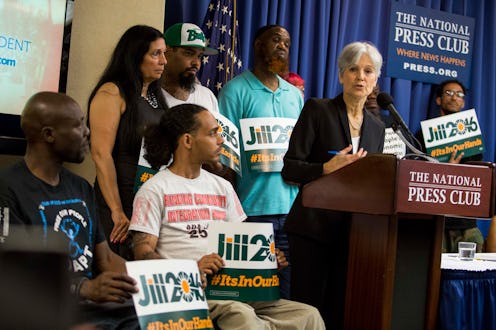News
Here's What Happens If You Vote For Jill Stein
Just because there happen to be two main parties that tend to monopolize the vast majority of the mental (and media) attention of the American public, that shouldn't detract from the fact that the Green Party has made significant inroads into the American public's consciousness. However, there is still a massive amount of misinformation out there about what happens when someone decides to cast their vote for the Green Party. So, just what happens if I vote for Jill Stein? She has been a leading candidate of the Green Party, and a vote for her could mean a lot of things.
Let's start of with what definitely will not happen if you chose to vote for the Green Party. Just because I'd like to get this out of the way once and for all, a vote for Stein is not a vote for Donald Trump. This is an unfortunate bit of flawed logic that armchair pundits like to pull out to sound informed and on top of the news. It also couldn't be further from the truth. The Republican National Convention, where the GOP nominee will be decided, has yet to occur. Casting Stein and the Greens as Nader-esque spoilers who will tip the electoral map in favor of the GOP isn't really historically accurate, either; at the end of the day, 2000 was decided by the Supreme Court, not by the voters.
Now that that is out of the way, let's take a look at what will happen if you (or someone you know) happens to vote for Stein and the Green Party in November during the general election. Voting for Stein's Greens isn't just a vote for Mother Earth, peace, nuclear disarmament, and a unicorn in every backyard — although I am kidding about the unicorn bit.
There is a lot of overlap between Stein's progressive platform and the kind of language that Sen. Sanders and his supporters hoped to see in the Democratic Party platform. So, if you're the kind of person who is inclined to believe what a politician says when you read their platform, a vote for Stein is also a vote for a $15/hour living wage, a vote that affirms that healthcare is a human right, and a vote in favor of taxpayer-subsidized education that will carry future American kids from preschool to post-doc studies.
Yet at the end of the day, for many people, a vote for Stein and the Greens is about choosing a smarter, more scientific approach to tackling the global systemic risk wrought by anthropogenic climate change, not about making some kind of ill-thought-out protest vote. Kicking off the transition to 100 percent renewable energy by 2030 isn't a project for the weak-willed, or small-minded, but it is the kind of "moonshot" clarion call to action that the American people have heeded in the past. While President Kennedy didn't live to see Neil Armstrong and Buzz Aldrin walk on the moon in 1969, America did manage to, and slightly ahead of schedule. It won't be a simple task to transition to 100 percent renewables in 14 years, but it is not a challenge outside of our technological grasp; it solely remains outside the realm of the mainstream political imagination.
Her campaign may be a long shot, but Dr. Stein and her party shouldn't be counted out of the running just yet. Not only are a record number of Americans declaring themselves independent from the duopolistic two-party status quo, in May, President Obama made sure to word his transition documents so that any "eligible candidate" would be able to take the reigns of power — not just a "major party" candidate, as specified in George W. Bush's transition papers. This subtle shift in rhetoric from the Obama Administration might just provide Stein's campaign with the necessary lift to really be taken seriously by the American public, and prove that a vote for Stein and the Greens in November might be an option worth considering, after all.
